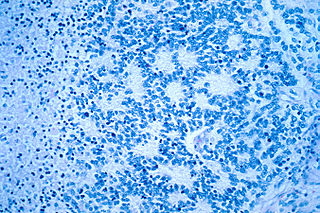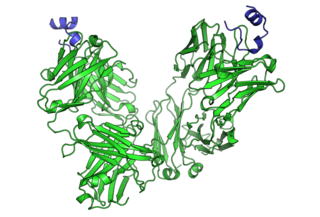Immunotherapy or biological therapy is the treatment of disease by activating or suppressing the immune system. Immunotherapies designed to elicit or amplify an immune response are classified as activation immunotherapies, while immunotherapies that reduce or suppress are classified as suppression immunotherapies. Immunotherapy is under preliminary research for its potential to treat various forms of cancer.

Neuroblastoma (NB) is a type of cancer that forms in certain types of nerve tissue. It most frequently starts from one of the adrenal glands but can also develop in the neck, chest, abdomen, or spine. Symptoms may include bone pain, a lump in the abdomen, neck, or chest, or a painless bluish lump under the skin.

GD2 is a disialoganglioside expressed on tumors of neuroectodermal origin, including human neuroblastoma and melanoma, with highly restricted expression on normal tissues, principally to the cerebellum and peripheral nerves in humans.

Cancer immunotherapy is the stimulation of the immune system to treat cancer, improving on the immune system's natural ability to fight the disease. It is an application of the fundamental research of cancer immunology and a growing subspecialty of oncology.

Targeted therapy or molecularly targeted therapy is one of the major modalities of medical treatment (pharmacotherapy) for cancer, others being hormonal therapy and cytotoxic chemotherapy. As a form of molecular medicine, targeted therapy blocks the growth of cancer cells by interfering with specific targeted molecules needed for carcinogenesis and tumor growth, rather than by simply interfering with all rapidly dividing cells. Because most agents for targeted therapy are biopharmaceuticals, the term biologic therapy is sometimes synonymous with targeted therapy when used in the context of cancer therapy. However, the modalities can be combined; antibody-drug conjugates combine biologic and cytotoxic mechanisms into one targeted therapy.
A blastoma is a type of cancer, more common in children, that is caused by malignancies in precursor cells, often called blasts. Examples are nephroblastoma, medulloblastoma, and retinoblastoma. The suffix -blastoma is used to imply a tumor of primitive, incompletely differentiated cells, e.g., chondroblastoma is composed of cells resembling the precursor of chondrocytes.
Siltuximab is a chimeric monoclonal antibody. It binds to interleukin-6. Siltuximab has been investigated for the treatment of neoplastic diseases: metastatic renal cell cancer, prostate cancer, other types of cancer, and for Castleman's disease.

Oncology is a branch of medicine that deals with the study, treatment, diagnosis and prevention of tumors. A medical professional who practices oncology is an oncologist. The name's etymological origin is the Greek word ὄγκος (ónkos), meaning "tumor", "volume" or "mass". Oncology is concerned with:

Tower Cancer Research Foundation (TCRF) is a 501(c)3 non-profit organization dedicated to clinical research, patient support and community education. It was established in 1996 in Beverly Hills, California.

Wolfram Samlowski is a medical oncologist with Comprehensive Cancer Centers of Nevada (CCCN) and a member of the Research Developmental Therapeutics and Genitourinary Committees for US Oncology. His research interests include translational research and development of novel cancer immunotherapy agents, translational drug development as well as gene therapy. His clinical interests are in developing more effective treatments for advanced stages of melanoma and non-melanoma skin cancers, and renal cancer.
Molecular oncology is an interdisciplinary medical specialty at the interface of medicinal chemistry and oncology that refers to the investigation of the chemistry of cancer and tumors at the molecular scale. Also the development and application of molecularly targeted therapies.
Urelumab is a fully human, non‐ligand binding, CD137 agonist immunoglobulin‐γ 4 (IgG4) monoclonal antibody. It was developed utilizing Medarex's UltiMAb(R) technology by Bristol-Myers Squibb for the treatment of cancer and solid tumors. Urelumab promotes anti-tumor immunity, or an immune response against tumor cells, via CD137 activation. The application of Urelumab has been limited due to the fact that it can cause severe liver toxicity.
Targeted molecular therapy for neuroblastoma involves treatment aimed at molecular targets that have a unique expression in this form of cancer. Neuroblastoma, the second most common pediatric malignant tumor, often involves treatment through intensive chemotherapy. A number of molecular targets have been identified for the treatment of high-risk forms of this disease. Aiming treatment in this way provides a more selective way to treat the disease, decreasing the risk for toxicities that are associated with the typical treatment regimen. Treatment using these targets can supplement or replace some of the intensive chemotherapy that is used for neuroblastoma. These molecular targets of this disease include GD2, ALK, and CD133. GD2 is a target of immunotherapy, and is the most fully developed of these treatment methods, but is also associated with toxicities. ALK has more recently been discovered, and drugs in development for this target are proving to be successful in neuroblastoma treatment. The role of CD133 in neuroblastoma has also been more recently discovered and is an effective target for treatment of this disease.

Jaume Mora is a Spanish physician and researcher specialized in pediatric cancer.
Cryoimmunotherapy, also referred to as cryoimmunology, is an oncological treatment for various cancers that combines cryoablation of tumor with immunotherapy treatment. In-vivo cryoablation of a tumor, alone, can induce an immunostimulatory, systemic anti-tumor response, resulting in a cancer vaccine—the abscopal effect. Thus, cryoablation of tumors is a way of achieving autologous, in-vivo tumor lysate vaccine and treat metastatic disease. However, cryoablation alone may produce an insufficient immune response, depending on various factors, such as high freeze rate. Combining cryotherapy with immunotherapy enhances the immunostimulating response and has synergistic effects for cancer treatment.
Checkpoint inhibitor therapy is a form of cancer immunotherapy. The therapy targets immune checkpoints, key regulators of the immune system that when stimulated can dampen the immune response to an immunologic stimulus. Some cancers can protect themselves from attack by stimulating immune checkpoint targets. Checkpoint therapy can block inhibitory checkpoints, restoring immune system function. The first anti-cancer drug targeting an immune checkpoint was ipilimumab, a CTLA4 blocker approved in the United States in 2011.

Crystal L. Mackall is an American physician and immunologist. She is currently the Ernest and Amelia Gallo Family Professor of Pediatrics and Medicine at Stanford University. She is the founding director of the Stanford Center for Cancer Cell Therapy.

Nirali N. Shah is an American physician-scientist and pediatric hematologist-oncologist, serving as head of the hematologic malignancies section of the pediatric oncology branch at the National Cancer Institute. She researches the translation of immunotherapeutic approaches to treat high-risk hematologic malignancies in children, adolescents and young adults.
Stephan A. Grupp is an American pediatric oncologist. He is the Chief of the Cell Therapy and Transplant Section in the Division of Oncology and Director of the Cancer Immunotherapy Program at the Children's Hospital of Philadelphia and Professor of Pediatrics at the Perelman School of Medicine at the University of Pennsylvania. In 2019, Grupp was elected a Member of the National Academy of Medicine.
John Matthew Maris is an American pediatric oncologist. He is the Giulio D’Angio Endowed Professor of Pediatrics at the Children's Hospital of Philadelphia (CHOP) and Full Professor at the Perelman School of Medicine at the University of Pennsylvania.










